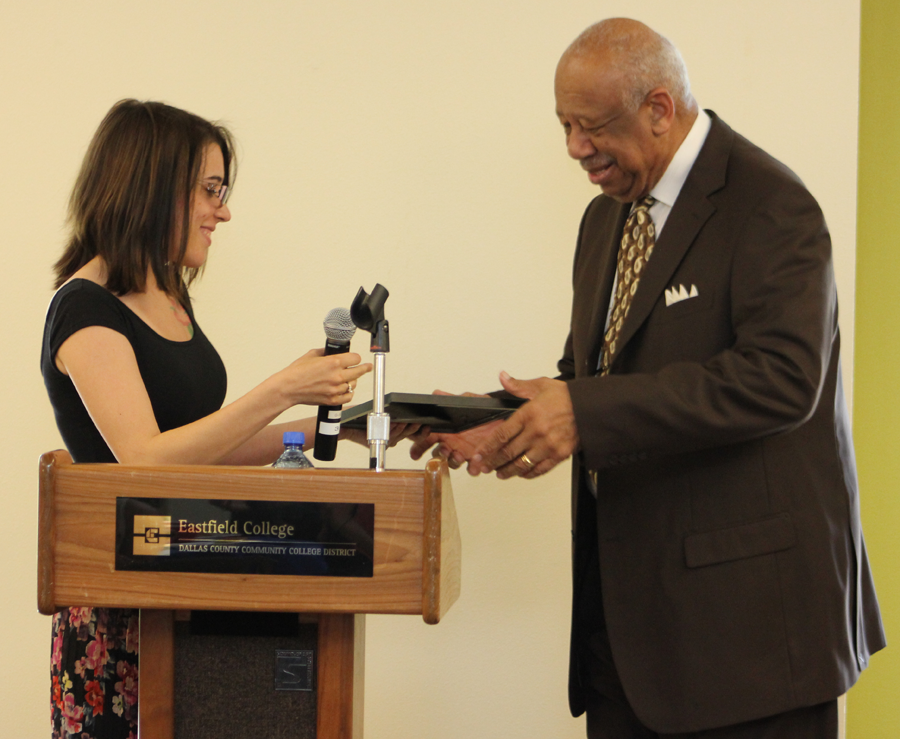Former Chancellor Lassiter’s impact lives on
Dr. Wright Lassiter receives a lifetime achievement award from Allison Johnson of the Communications Club. He spoke to the club about the importance of communication skills.
February 14, 2023
In 2006, Dallas College needed help. Damaged relationships within the college required a chancellor who could nurture it back to health. Wright Lassiter Jr. was swiftly appointed and served as chancellor for the next seven years.
“He really came in as a person to help rebuild the culture of the district,” said Ann Hatch, former district director of media relations. “We really kind of viewed him as a peacemaker. Someone who wanted to respect the history of the district, the role that employees play and the importance of students.”
He made an impact on the college, community and individuals, that many still appreciate to this day.
“He left an amazing legacy on El Centro, on Dallas College as a whole and the countless thousands of students and employees that he supported,” current Chancellor Justin Lonon said. “And certainly having the Lassiter Early College High School live on at El Centro, I think is a real testament to him.”
Lassiter led the expansion of Dallas College during his tenure. A $450 million bond package for the college was passed in 2004, and he oversaw its completion. The program was responsible for the addition of 29 new buildings throughout the district, which helped accommodate exceptional growth in enrollment with 80,000 credit students.
Before taking his position as chancellor, Lassiter served as president of El Centro for 20 years. He was asked to step in as interim chancellor when Jesus Carreon resigned abruptly at a board of trustees meeting. Then it was decided that Lassiter should hold the role permanently.
Because of his history with the district, people already knew who he was and what he stood for. According to Hatch, an open door was prioritized in his leadership.
“He was an excellent communicator. As someone in news and media relations, you value a CEO who understands the role of communication, the importance of public relations and the importance of responding to the news media. He did all of those things. He was always accessible.”
Lassiter helped those around him professionally and personally.
“I remember one time, because I respected his writing abilities, that I wanted to talk to him about what it took to write a book,” Hatch said. “I’d always wanted to write one but just really never had the time. But he took the time to sit down with me, talking with me about it and giving me some advice. And I really appreciated the fact that it wasn’t chancellor to employee. It was writer to writer.”
Lassiter had a reputation for pushing his employees to do more than they thought themselves capable. Lonon experienced this personally.
“I give him a lot of credit for my personal career development and growth, certainly within higher education,” Lonon said. “He gave me responsibilities for different functional areas at the time that I didn’t necessarily have a background in, but he thought that I had the abilities to take on.”
Lonon credits Lassiter for encouraging him to return to school to earn his doctorate and to eventually be chancellor himself.
Lassiter’s relationships with his employees didn’t stop at career advice and encouragement. He took the time to know the people he worked with on a more personal level, and to nurture those interpersonal dynamics.
As a big fan of Auburn University football, Hatch regularly collected memorabilia and cheered the team on. When Lassiter learned this about her, he never forgot it.
“He served on the advisory board of Auburn’s College of Education,” she said. “And when he went to Auburn, they would give him things like a calendar or a notebook or other things to use. And when he came back, he would always make sure that they found their way to my desk, which I really loved.”
Auburn went on to win the national football championship one year while Lassiter was chancellor and he even made sure Hatch got his copy of Sports Illustrated that featured the win.
His involvement within the college was significant, but Lassiter was also very present in his surrounding community.
He served for six years as a member of the board of the Texas Council on the Humanities, 15 years as chairman of the board of trustees of the Dallas African American Museum and nine years as chairman of the board of the Urban League of Greater Dallas and North Central Texas.
During his 30 years working in higher education, Lassiter was appointed to national advisory positions by two U.S. presidents.
He served as a member of the White House Commission on Minority Business Development by President George H.W. Bush as well as the National Advisory Council to the National Endowment for the Humanities by President George W. Bush.
Lassiter died in 2019, five years after his retirement from Dallas College. During his time as chancellor, he became a confidant for many employees and community members, said Lonon.
“In addition to his lifelong legacy of servant leadership, Dr. Lassiter lives on through the work and service of those for whom he served as mentor,” Eastfield history faculty member Matt Hinckley said.





